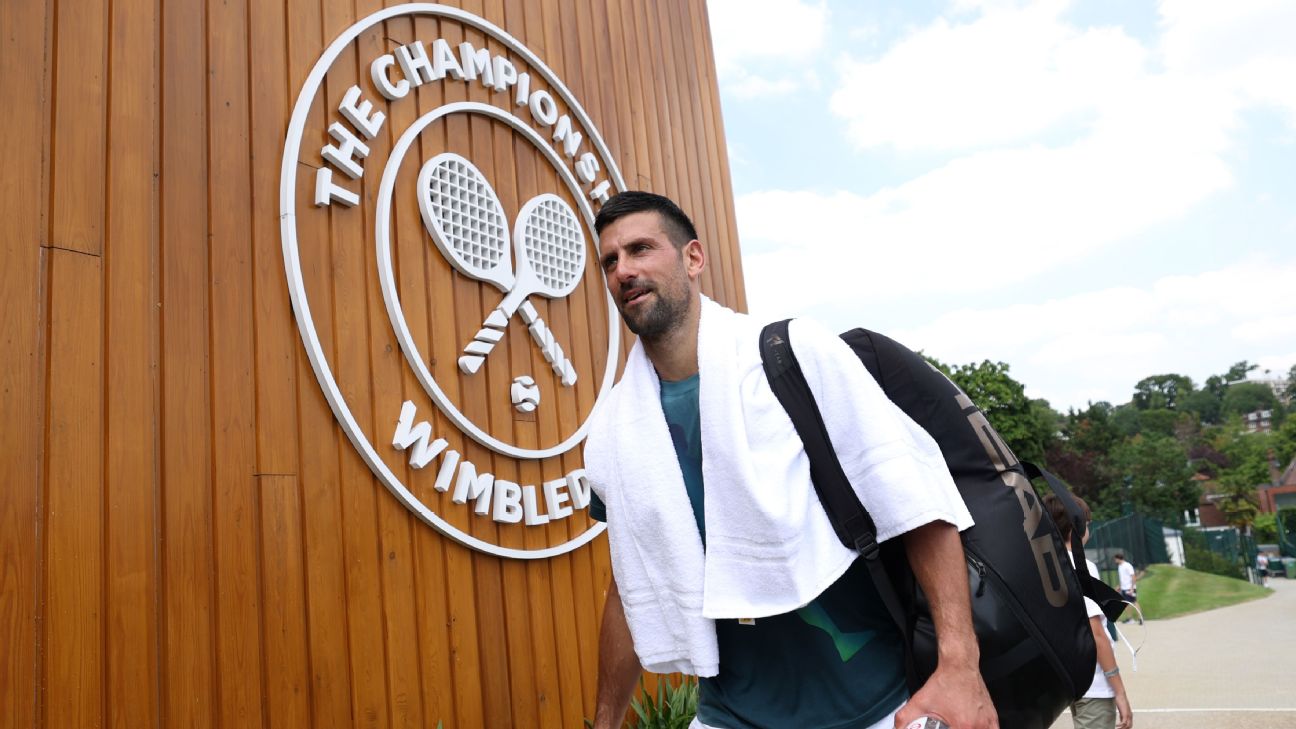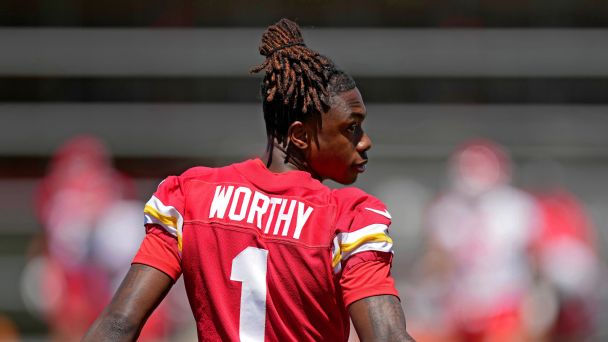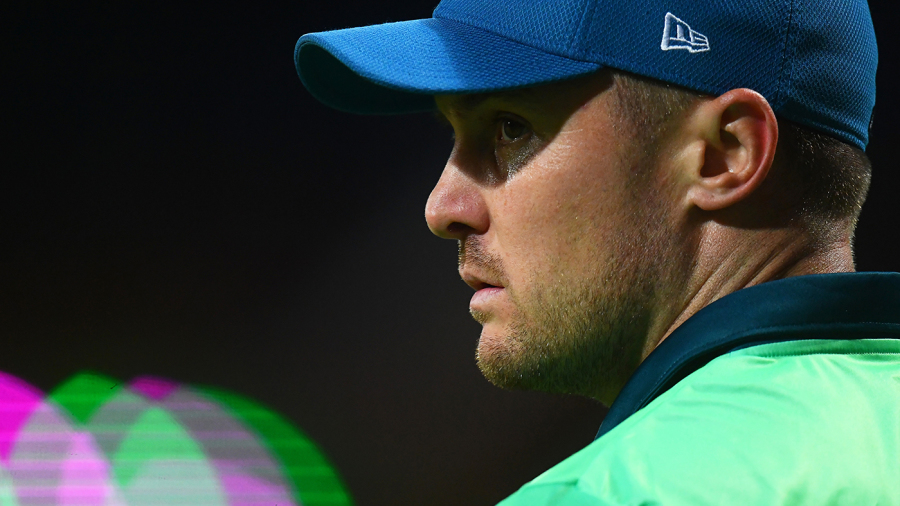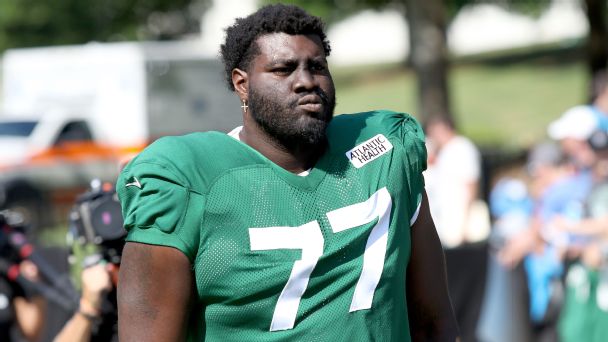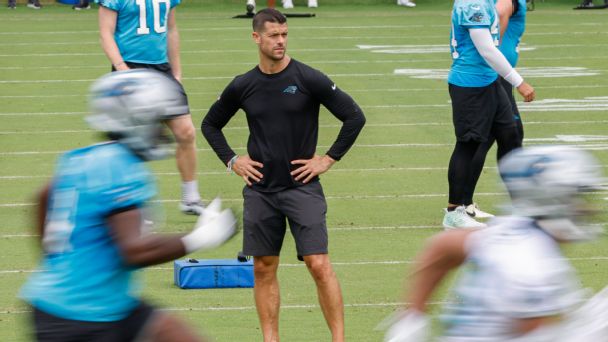![Dolphins Bills line of scrimmage [608x342]](https://a.espncdn.com/photo/2024/0618/r1347279_608x342_16-9.jpg)
Mark Vientos hits 2 solo homers Mets hang on to beat AL East-leading Yankees 9-7 in Subway Series
TWELVE MINUTES AFTER booing Roger Goodell as he strode on the set of "The Pat McAfee Show" in front of a live audience in the hours leading up to the second round of the 2024 NFL draft in Detroit, fans abruptly changed their tune.
The jeers turned to hoots and hollers as the NFL commissioner told McAfee he wasn't a fan of preseason games, and they increased a few seconds later when Goodell said he'd be in favor of eliminating one of the three current preseason games to expand the regular-season schedule from 17 games to 18.
"I'd rather replace a preseason game with a regular-season game any day," Goodell said. "That's just picking quality. If we got to 18 and two, that's not an unreasonable thing."
Just like that, a once-dormant conversation was reignited, ripping through group chats and locker rooms. An additional regular-season game seems like a no-brainer win for the league and the fans. That 18th game means more revenue for the league and its owners, and it would push the Super Bowl back to Presidents Day weekend, meaning many would enjoy a Monday holiday after the Sunday night Super Bowl.
But for players, it's not so clear-cut.
"I think it's up to every player to decide," Indianapolis Colts center Ryan Kelly said. "If they said, 'Hey, you guys get 70% of revenue and we'll take 30 as owners,' a lot of guys would sign up for that if you make $100 million playing quarterback [the current revenue split is approximately 52% to 48% in favor of owners]. So I think everybody's got a line they draw in the sand, and we'll see where that is."
ESPN surveyed players from multiple teams for their opinion on adding an 18th game and playing the Super Bowl on Presidents Day weekend. Although most were indifferent about a later Super Bowl, some had strong feelings about adding a regular-season game at the expense of a preseason game, while others were still wrapping their heads around the possibility and the ripple effects.
"Eighteen games sounds great when Roger's on the Pat McAfee [Show]," said Kelly, who is on the NFLPA's executive committee. "Until you're the one that's going out there and putting the helmet on for 18 of those games, then come talk to me."
AS PITTSBURGH STEELERS safety Damontae Kazee considered the question about an 18-game season, teammate DeShon Elliott stood a couple of lockers away shaking his head vehemently as he overheard the exchange.
"Whatever the league gives you, man, you just got to adjust to it," Kazee said with a shrug. "I got to this point in my life, I'm an old head now, about to be 31. You just got to adjust to everything and go on from there. ... Them giving us 18 games, I mean, I wouldn't complain about it.
Elliott interjected: "I would. They don't pay us enough."
Kazee laughed and continued: "I mean, I'm straight. I wasn't getting paid like this where I was at. ... It can be positive for both sides. People look at it as another week to feed your family. ... I love it."
That exchange between the teammates is a microcosm of discussions being held in locker rooms around the league.
Of the players surveyed by ESPN, 46% were in favor of an 18-game schedule with stipulations and 8% voted yes without stipulations.
"If they take out a preseason game, I'm OK with that as long as the pay correlates with what they're asking us to do," Carolina Panthers tight end Tommy Tremble said. "If they're gonna make us do one more game, then they need to add something to the check. I'm totally fine doing my job, man. But whatever they decide, hopefully it's for the best intentions of the league and for the players themselves.''
Added teammate Josey Jewell: "Another game equals more money? Sure. Let's do it."
But to those who went through the contentious collective bargaining agreement negotiations in 2020, adding a second bye week, eliminating two preseason games and depositing an extra week's game check isn't enough.
As negotiated in the last CBA, NFL players can receive a maximum of 48.8% of the revenue in any 17-game season. If league owners are intent on adding an 18th game before the expiration of the current CBA in 2030, the union could use the opportunity to increase the players' share of revenue.
"They're not paying us enough money already," Elliott said. "They're stingy with their money, so they want to make us play 18 games, as a player union, we should get way more money than what we're getting -- and not just the top guys. And the thing is, they're not out here playing football. They're not here running around putting their bodies on the line. They don't care. All they care about is making money, but if you're going to make money on the top end, the bottom end has to make money too."
Elliott was part of the 19% of players surveyed who were completely against regular-season schedule expansion. Fellow Steelers safety Minkah Fitzpatrick is part of that group, too.
"Why do we keep adding games?" Fitzpatrick asked. "I think 17 is more than enough, plus a playoff. ... The dudes that play a hundred percent of the snaps in the regular season are probably barely playing in the [removed] preseason game, so it doesn't really do too much."
For many of those players, no amount of compromise and extra money can account for the extra risk to player health and safety.
"You're talking about player safety, but how do you have player safety when you add a game," Steelers offensive lineman James Daniels said. "If they were worried about player safety, it would take away games, but it's not about player safety, it's about money and extra games -- an extra prime-time game -- that brings millions of dollars to the NFL, millions of dollars to cities everywhere. I understand it from both sides."
Buffalo Bills offensive lineman Dion Dawkins echoed Daniels, adding that longer seasons can increase the injury risk and shorten careers, all while decreasing opportunities for players to prepare for their inevitable life after football.
"It's hard to grow yourself," Dawkins said. "I'm so big into playing ball, like No. 1. But you still have to grow your person for when football is over, right? And when it comes to them 18 games, it just shortens that time for when the offseason comes and you can really dive into who you really are. And your most valuable asset is when you're playing. When you're not playing, nobody cares, and it sucks, but you have to build yourself so when you're done playing, you're relevant."
While more than half of players surveyed raised points for and against an expanded schedule, 27% of respondents didn't have a concrete response to a potential 18-game proposal.
"It's a long season, man," San Francisco 49ers quarterback Brock Purdy said. "You go through so much physically and mentally and everything. But if we're going to extend it another game, I think another bye would be pretty nice. But at the same time it's longer ... I don't really know how I feel 100% on it yet."
And many others expressed apathy and a resignation that they'd end up doing whatever others decided.
"It's above my pay grade," Seattle Seahawks wide receiver DK Metcalf said. "So if we play 18 games, I'll be out there for 18 games."
OF ALL THE ideas the commissioner floated in that McAfee interview, the suggestion of a Presidents Day weekend Super Bowl earned the loudest applause from the fans gathered outside the set.
And yes, a byproduct of an 18-game schedule with an additional bye week is bumping back the Super Bowl to the third weekend in February, making the day after the Super Bowl a national holiday. A fan's dream come true.
"I think [fans] should have that day off [after] anyway," Bills defensive lineman DaQuan Jones said.
Panthers running back Miles Sanders deflected the question.
"Hey, man, we've got to make it there first," he said.
Like Sanders, many players in the league care less about the date of the big game and more about simply being in it -- even if it means they're playing an extra-long season.
"A couple people are going to feel like [NBA MVP Nikola] Jokic -- ready to go home," Las Vegas Raiders cornerback Nate Hobbs said. "But, it takes what it takes. The real champions are going to emerge, and the real, mentally strong survive. And I know we've got that on our team, so it really don't matter.
"Presidents Day and February all run into each other. To me, it's all the same. It is what it is, man. I know it's all for entertainment."
THE IDEA OF an 18-game schedule -- and the division around it -- is hardly new. League owners first formally proposed an "enhanced" schedule in 2010, offering to eliminate two preseason games in exchange for the addition of two regular-season games.
In response, the NFLPA's good-faith counterproposal asked for a reduced voluntary workout period, two bye weeks and a specific number of helmet-less and pad-less practices during training camp.
At the time, some of the league's most prominent figures spoke out against it. "Don't get me wrong, I love the game of football," then-Ravens linebacker Ray Lewis said in 2010. "If fans want to show their love, they should let everyone know that we are not machines. I've been blessed to play this game for so long, but it's time to start thinking about what legacy and impact changes like this will leave for the players of tomorrow and us after we retire.
"I know our fans may not like preseason games, and I don't like all of them, but swapping two preseason games for two end-of-season games -- when players already play hurt -- comes at a huge cost for the player and the team."
Nearly a decade after the 2011 lockout, a tightly contested 2020 CBA allowed for a one-game addition to the regular season in addition to an expanded playoff field.
As expected, the league wasted little time implementing that extra regular-season game, moving to a 17-game schedule beginning with the 2021 season.
While league owners were nearly unanimous in efforts to expand the schedule during previous CBA negotiations, there are signs that not all would be on board with the move to 18 games.
"Substituting a regular-season game for a preseason game is probably more acceptable for the fans," New York Giants owner John Mara said in May. "I can't say I'm necessarily crazy about extending the season. I worry more about player fatigue and wear and tear on the players moving forward. That's one of the reasons why we have to have the discussion with them."
Even if public opinion -- and some locker room opinion -- strongly supports adding an 18th game, there's a steep mountain to climb to expand the schedule.
For the two sides to engage in negotiations before the current CBA's expiration after the 2030 season, the owners would first have to come to a consensus about the 18-game schedule. Then, after presenting a proposal to the league, the ownership group and NFLPA would engage in negotiating an entirely new CBA -- think of it as ratifying a new constitution rather than simply adding an amendment.
In those negotiations, the union would undoubtedly come up with its own wish list to facilitate acceptance of the additional game -- a list that could include a revamped offseason workout schedule as well as an improved revenue split. Once negotiations were hammered out, a vote would go to the NFLPA board and membership to ratify a new CBA, with a majority needed for approval.
With a push toward 18 games comes rare leverage for the players. It's an opportunity that doesn't come along often, one the league's players are carefully mulling as calls intensify for more games and longer seasons.
"I'm always down to play more football," Las Vegas Raiders wide receiver Davante Adams said. "But it makes more sense when you're fighting for something, too."
ESPN reporters Ben Baby, Alaina Getzenberg, Paul Gutierrez, Brady Henderson, Stephen Holder, David Newton and Nick Wagoner contributed to this story.









